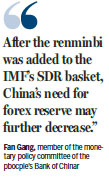Advisors urge calm on forex decline
China's diminishing forex reserve, now below the closely watched $3 trillion mark, has triggered market concerns, but two advisors to the nation's central bank believe that such worries are overblown.
The decline does not warrant such worries, and was indeed a good thing, according to Fan Gang, a Chinese economist and member of the monetary policy committee of the People's Bank of China, the central bank.
China's forex reserve dipped to about $2.998 trillion in January, down from about $3.01 trillion in December 2016, representing the seventh consecutive monthly contraction, State Administration of Foreign Exchange data showed recently.

"A large chunk of Chinese forex reserve was used to purchase US treasuries, which can only yield low investment return," Fan said during a recent interview with China Securities Journal, a newspaper run by Xinhua.
Fan said that the investment efficiency of China's forex reserve has been a continuing debate for years, as some observers hold that China's forex reserve investment overseas is of low efficiency while foreign investors can reap higher returns in China.
Fan said that from the perspective of investment efficiency, the drop was a good thing, adding that the decline was accompanied by more forex reserve held by Chinese households, and the private sector could aim for investments like stocks and bonds that yield higher returns.
In 2007, China increased the quota for individual forex purchases from $20,000 per person a year to $50,000.
"After the renminbi was added to the International Monetary Fund's Special Drawing Right basket, China's need for forex reserve may further decrease," Fan said.
When asked about the exchange rate of the renminbi, Fan said that he believed that the bigger question was the strength of the dollar in the near and longer term.
The strength of the greenback hinges on factors such as the tax cut plans of the Trump administration and the pace of interest rate hikes from the Federal Reserve, he added.
Li Daokui, a former member of the central bank's monetary policy committee, predicted that pressure on renminbi depreciation could ease in the second half of this year as some policies of the Trump administration might not deliver the intended results and appreciation of the dollar could slow.
























